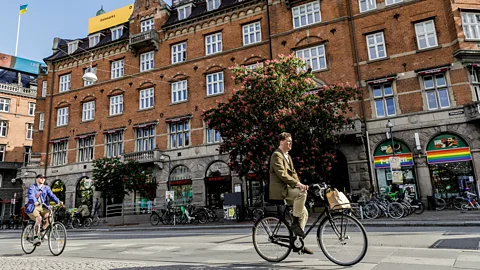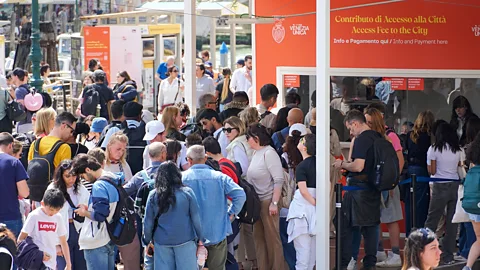Source link : https://love-europe.com/2024/10/07/travel/the-summer-that-tourism-fell-apart/
Getty Images
Santorini is approaching over saturation and now wants to restrict the number of cruise ships (Credit: Getty Images)
After a summer of protests in some of Europe’s most popular travel destinations, what might your summer holiday look like in 2025 – and beyond?
As the peak summer tourism season draws to an end, it’s clear that the issue isn’t over. Last month in Rovaniemi, the capital of Lapland in northern Finland, a tourism protest sought to draw attention to the impact mass tourism has on winter destinations too.
 Getty Images
Getty Images
Copenhagen has announced that its pilot CopenPay project will be extended (Credit: Getty Images)
Destinations will need to change their approach
Jeremy Sampson, CEO of The Travel Foundation, a nonprofit dedicated to ensuring that tourism has a positive impact on destinations, has been working since 2003 to move the industry towards a more balanced model that benefits locals and the environment alike. “This isn’t the first time overtourism has arisen,” he tells the BBC. “Just before Covid in 2019, the issue was starting to crescendo. Communities were starting to get frustrated with tourism and destinations had lost control.”
However, he doesn’t believe that overtourism is the real issue. Instead, he says, we need to address the root cause, which is “bad, unbalanced planning. Tourism is complicated to regulate, and it has to be an aligned ecosystem of people; that comes initially from the destination.”
Thoughtful Travel
Want to travel better? Thoughtful Travelis a series on the ways people behave while away, from ethics to etiquette and more.
Other places are looking to better manage the tourists who arrive, hoping to find a mutual win for travellers, locals and destinations alike. Copenhagen has announced that the city’s pilot CopenPay project, which offered free entry to cultural centres and museums to travellers who exhibited sustainable behaviours, will be extended in 2025. The pioneering scheme has had a ripple effect, too, according to Rikke Holm Petersen, director of communication at Visit Copenhagen: “As a result of CopenPay, we have held meetings and had approaches from a wide range of tourism organisations worldwide, including, among others, the EU Commission, VisitBerlin, the government of Zurich, the Tokyo municipal government and Tourisme Montreal.”
Travellers should expect prices to go up
Another way that cities and countries are regulating numbers is through tourism taxes, and travellers are going to see more and more of it, if this summer’s pilot projects are anything to go by. The Venice tourist tax, which trialled this year, requiring day trippers to register and pay €5 to enter, will be rolled out in a second trial phase next year, potentially with higher fees and a longer duration.
 Getty Images
Getty Images
The Venice tourist tax, which trialled this year, required day trippers to register and pay €5 to enter (Credit: Getty Images)
Elsewhere in Italy, Rome’s deputy mayor of tourism, Alessandro Onorato, wants to introduce a ticketing system for the Trevi Fountain, with tourists paying a €2 fee that will go towards protecting the iconic monument.
Elsewhere in the cruise industry, Greece has been mooting a €20 per passenger cruise fee for ships docking at its most popular islands, Santorini and Mykonos. Santorini has previously welcomed upwards of 10,000 passengers per day; the additional fee may act as a deterrent to large cruise liners, which have been criticised for their role in “hit and run” tourism.
Cheap rentals will be harder to find
With New York outlawing short-term lets already, Barcelona banning them by 2029 and Edinburgh’s new regulatory system limiting them, it looks more likely that, moving forward, more of us will be staying in hotels than central short-term lets – typically paying more too. If we want to stay in local-style accommodation, it will most likely be outside city centres.
 Getty Images
Getty Images
Intrepid’s new “Not Hot” List suggests Guyana as a lesser-known places that’s ready for – and deserving of – more visitors (Credit: Getty Images)
Consider going somewhere new
While some parts of Europe have been creaking under the strain of tourism, other areas are open for business and are happily welcoming travellers. Second cities, third cities and lesser-visited destinations are getting more attention – and it’s all good news for travellers.
This year, instead of sending out a list of hyped destinations where people should go, thereby fuelling overtourism, tour operator Intrepid instituted a “Not Hot” List, highlighting less-popular destinations that deserve a spotlight. Their aim is to shift the positive benefits of tourism to places that need it. It’s a good signpost for anyone planning their travel next year: instead of Argentina, South America’s most-visited country, they suggest the natural wonders and cultural experiences of Guyana, its least-visited country; rather than better-known Stockholm, it champions Oslo as one of the underdogs of the Scandinavian travel scene.
It will take time until we see many first-time visitors skip the most iconic places – Samira Holma
The question is, do people want to ditch their travel dreams – the classic travel destinations – to go somewhere new? Place development and destination marketing specialist Samira Holma works with destinations from Brazil to Spain, with a particular focus on sustainable tourism, and considers this a complicated issue. “For now, more people who’ve already been and are well-travelled will start to explore beyond, but many first-time visitors continue to go to the hotspots,” she says. “As slow travel becomes more common, people will add other stops to the itinerary that may be lesser known. But I still think it will take time until we see many first-time visitors skip the most iconic places.”
She also notes that different cultures have different travel habits and patterns. While European travellers show more openness to explore underrated places, she cites reports showing that travellers from markets like China and the UAE tend to be drawn to the classic bucket list experiences.
So, what should you do when planning your next holiday? Sampson has one piece of advice for individuals who want to be part of the solution, not the problem. “I would encourage people to do some research and dig beneath the surface,” he says. “Gen-Z has a values-based decision-making process that is a good approach to copy. And think about it: if a place is choked with people, is it going to be a good experience for locals? Is it going to be a good experience for you?”
Source link : https://www.bbc.com/travel/article/20240925-the-summer-that-tourism-fell-apart
Author :
Publish date : 2024-09-26 07:00:00
Copyright for syndicated content belongs to the linked Source.
The post The summer that tourism fell apart first appeared on Love Europe.
—-
Author : love-europe
Publish date : 2024-10-07 00:06:42
Copyright for syndicated content belongs to the linked Source.
